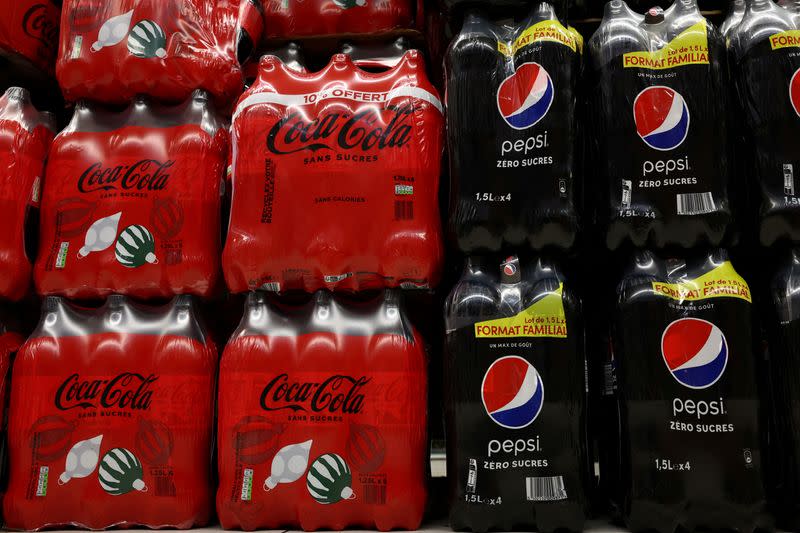Analysis-Carrefour-Pepsico dispute sheds light on key role of retailers' ad business

By Helen Reid and Richa Naidu
LONDON (Reuters) - Carrefour and PepsiCo's just resolved three-month price dispute has shed light on a new aspect of such negotiations which is changing the relationship between retailers and suppliers.
Pepsico said on Thursday the two companies had reached an agreement that will see the food and drink conglomerate's products, which include Pepsi, Doritos chips and Quaker oats, return to Carrefour's shelves in France.
That agreement has yet to extend to Carrefour stores in Belgium, Italy, Poland and Spain, according to a person familiar with the discussions.
The dispute, which started on Jan. 4, was an example of the increasing frictions between consumer goods giants and retailers at a time when they push to sell more advertising makes the two industries more interdependent.
Carrefour and Pepsico, did not disclose the terms of their deal, but their relief was palpable.
"Delighted that our products are back in Carrefour's aisles," PepsiCo France said on X on Thursday, while Carrefour France CEO on Wednesday posted a photo of himself in an aisle of Pepsi bottles with the caption: "It's great to see friends again that we hadn't seen in a long while."
Neither group has given estimates of the three-month-long standoff's impact on their revenues, but when the French retailer pulled Pepsico products off its shelves it was not just risking a hit to its sales.
It was also irking an important client of its growing business of selling advertising space both in-store and online -referred to jointly as retail media - to consumer goods giants like Pepsico.
This new business, still in its infancy in Europe compared to the United States, shifts the dynamic in pricing talks as consumer goods firms become both clients suppliers.
When retailers pull brands as a negotiation tactic, it hurts their relationship with suppliers and makes brands less willing to spend on their advertising services, said one consumer goods executive, who declined to be named.
That makes advertising budgets an ace up the sleeve of consumer goods giants in price talks, said Laurent Thoumine, Accenture's Europe lead for retail.
"That's important for most retailers because the net margin you're generating for retail media is much higher than the margin you're generating thanks to your stores," he said.
According to an eMarketer report from 2023, retail media networks could provide margins of between 40% and 80%, while Alvarez & Marsal forecasts that average retail margins are only 5%.
Carrefour's spat with PepsiCo is one of several recent pricing disputes in Europe.
German retailer Edeka is in an ongoing dispute with cereal maker Kellogg over prices, saying the company has refused to supply it since June last year. Edeka also did not sell Mars products for more than 18 months, from mid-2022 until a price dispute was resolved in February this year.
Belgian supermarket chain Colruyt was also at odds with Mars, maker of brands including Maltesers, Orbit chewing gums and Royal Canin pet food, over prices at the start of this year. It also temporarily pulled some AB InBev and Unilever brands from stores late last year before coming to agreements with the companies.
In pricing talks with suppliers, spending on advertising space on the retailer's website and in stores can be a factor, a Colruyt spokesperson told Reuters.
Consulting firm McKinsey estimates that retail media will generate about $100 billion in advertising spending by companies by 2026.
For companies, such as Pepsico, Unilever, Nestle, and Danone, retailers' websites and apps offer an ideal space to target specific consumers, while providing valuable shopper data to measure how successful ads are in driving purchases.
In its annual report, PepsiCo listed the "increasing power of retailers" as a key risk to its business. It said retailers have impacted and may continue to impact its ability to compete by demanding lower prices, removing its products, or reducing their shelf space.
Pepsico, which according to its annual report generates 15% of its revenue in Europe, said its beverage revenues in France declined at a high-single-digit percentage rate in 2023 while snacks revenues declined at a mid-single-digit rate.
Ultimately, such lengthy and high-profile disputes carry risks for both sides. While Carrefour and other retailers portray themselves as fighting for consumers, pulling products is risky as branded foods are a key revenue earner and shoppers can easily find their favourite brands elsewhere.
"If you're a number one or two retailer you have the power to remove products, but if you're not as big, you need branded products to get traffic into your stores," said Moritz Kronenberger, a portfolio manager at Union Investment, a shareholder in retailers and consumer goods companies from Nestle and Pepsico to Carrefour.
(Reporting by Helen Reid and Richa Naidu; Editing by Matt Scuffham and Tomasz Janowski)

 Yahoo Finance
Yahoo Finance 